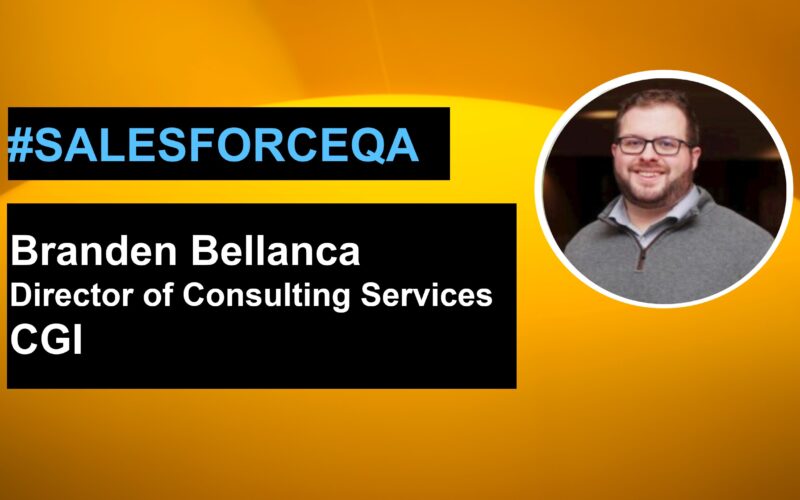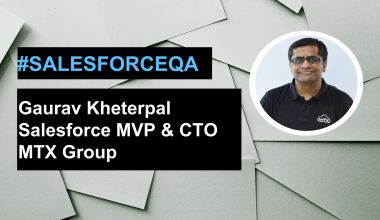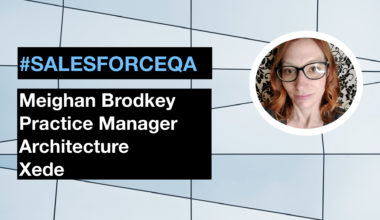In our most recent #SalesforceQA, we caught up with Branden Bellanca, Director of Consulting Services – Salesforce at CGI.
Branden talks about his process for preparing to take a cert and offers top tips for others looking to become Salesforce certified.
Branden also highlights what you should be watching out for this year and gives advice on how you can stand out during the interview process.
Salesforce Republic (SR): To start, could you tell us about your career journey and what inspired you to pursue a career in Salesforce?
Branden Bellanca (BB): I started my career as a test automation developer. Our team was tasked with replacing an aging, monolithic .NET app that had effectively run the organization for decades with a CPQ and Contract Management solution built on the Salesforce platform. The internal team was responsible for integrations and any support work outside of Salesforce and a partner was brought in to implement the Salesforce piece. Unfortunately, almost immediately, the partner began falling behind schedule and the quality of the Salesforce implementation suffered. As time passed, the number of bugs and issues continued to pile up, causing a lot of headaches and frustration for the team and to the organization. The organization also had very little internal Salesforce knowledge so wasn’t able to take over the work.
I was driven to do whatever I could to make the team successful. I wanted to be helpful. I signed up for a developer org, and every night, I’d sit down at my computer and immerse myself in Salesforce training material. I remember starting with a guide/tutorial that walked you through building a recruiting application from scratch (these were the crazy training days before Trailhead was where it is today). I was hungry to prove myself; I’d read anything and everything I could get my hands on to build up my understanding of the platform. I started making recommendations on fixes. I started debugging issues that we were finding and then providing solutions for them. Eventually, my Project Manager allowed me to start picking up some of the bug work and small feature enhancements. Before I knew it, I was leading the development effort for the project. I began teaching others about the platform and evangelizing everything I had learned to help build the next set of trailblazers. When I left the company, I was leading the development team as a Salesforce technical lead and mentoring 10+ others on the platform.
Since then, I’ve never looked back. I’ve been a BA, a Developer, an Admin, an Architect, and many other roles across industries over the course of my Salesforce journey. With every new opportunity, I am constantly learning something new. I always tell new folks that you could spend your entire career doing work in different parts of the platform and never get bored. This is why I love this space.
SR: You are 20x Salesforce certified, could you talk a bit about your process for preparing to take a cert? What are your top tips for others looking to become Salesforce certified?
BB: Often, the certs I go after are related to work I’m preparing for or am currently doing. Jumping on the Trailhead platform for a given cert can provide a great foundational understanding of a subject, but for me there is no substitute to getting your hands dirty. I’ll often look for opportunities to pair with others on my team who are working on something related, or even try to pick up a small card relevant to the subject, if time permits. Reading blog posts about a particular subject that highlights real use cases is also helpful. I think it’s important tie the cert to other things you know and many posts do a good job of doing that.
There are a few strategies I’ve used over the years that you can try on your next cert:
Take a Phased Approach
Take a first pass of the entire exam, quickly but carefully reading each question and only answering questions you’re 100% confident about while skipping the rest. This gives you an early look at what your baseline score will likely be, and since the exams can be tiring, this can be a great way to make sure that you definitely get credit for what you know.
Use other Questions to Your Advantage
During your first passthrough, keep a mental note of those features you aren’t 100% sure about. Sometimes, another question may mention this capability in another context which can jog your memory or even give you the answer to the other question.
Eliminate the Wrong Answers
This is a classic piece of advice for a multiple-choice exam, but a good one for these certs. Always look to eliminate answers that don’t make sense. This technique can help eliminate the “noise” and leave you with fewer answers to consider.
Remember Salesforce is Awesome
If you’re stuck between 2 answers where one says Salesforce can do something and one where it says it can’t, it’s better to pick the former. Salesforce is an amazing platform, and if given the choice, the exam will lean toward showing off its capabilities.
SR: In the debate of certifications vs experience, in your opinion which do you think holds more value for career progression in the ecosystem?
BB: In my opinion, a healthy combination of both experience and certs holds the most value in the ecosystem. I am in the camp that you learn best by doing. There is nothing better than working in Salesforce day-to-day. That being said, to be successful in this environment, you need to be a continuous learner.
I view certs as a conduit to learn and supplement your skills. It’s one of those “it’s about the journey, not the destination” situations. Often, the certs I go after are because of work that I have upcoming or that I’m currently doing. For instance, when I had an upcoming project that required OmniStudio/Vlocity, I jumped onto the metaphorical and literal trail to becoming an OmniStudio Consultant and OmniStudio Developer. Those with both experience and a cert in a particular subject show a drive to be a solid practitioner of their craft.
SR: As the Director of Salesforce consulting services at CGI, are there any particular skills you think trailblazers need to develop in order to be successful in the consulting space?
BB: The best consultants are the ones that stay curious. Salesforce is a rapidly evolving platform with new features dropping all the time. Staying on top of the release cycle, reading about upcoming features and capabilities, and hitting the trail on features that interest you, can really set you apart. It gives you the chance to pull from a wider toolbox to solve problems and often articulate better solutions to your clients.
Being curious also means looking for opportunities to help outside your lane. The best consultants I’ve worked with could not only be just an admin or a developer, but could do work interchangeably with the rest of their teammates. For example, Admins who could just jump in to create apps with lightning app builder or create dashboards and could also be Business Analysts. Developers who could write Apex and build LWCs and also configure forecasting and build a flow. Having polyglot skills is very much what sets apart the best Salesforce Consultants from the rest.
SR: With Salesforce and it’s ecosystem of partners predicted to create 9 million jobs by 2026, do you have any advice for standing out during the interview process?
BB: Show off your drive to be a master of your craft. Talk about local community events you’ve attended, presentations you’ve given, and the latest badge or cert you’ve earned. Show the interviewer that you are a lifelong learner and will be someone who is looking to continue building and honing your skills on the platform.
SR: You are also a community leader, in your opinion, how important is community to career advancement?
BB: Being part of the community is the key to success in the Salesforce ecosystem. The Salesforce community is filled with incredible people across all walks of life, different backgrounds and experiences who love being in and helping others in the Ohana. Harnessing the community to learn something new, to build life-long relationships, networking with peers and mentors and sharing your knowledge will help ensure that you have a long, successful career in Salesforce.
SR: Finally, what’s something you think all trailblazers should be watching out for this year?
BB: Make sure you checkout Salesforce DevOps Center! It is going to take managing the change and release management process in Salesforce to the next level. On top of tracking work items directly in Salesforce, the tool automatically tracks changes in development environments and allows user to migrate changes from environment to environment with a much more modern set of tools. It’ll even allow for a “hybrid” approach that works in tandem with developers deploying using VSCode or the Salesforce CLI. This is the tool I’ve wanted my entire career!
If you’re a Salesforce professional and would like to join Branden in our Q&A series, please get in touch with us today!


